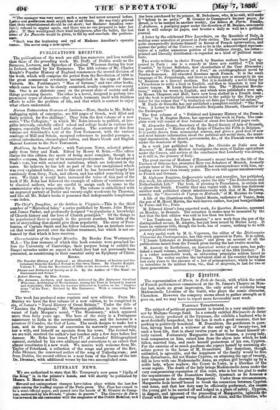PUBLICATIONS RECEIVED.
• The publications of the week are still less numerous and less notable than those of the preceding week. Mr. Duffy of Dublin sends us the Sermons, Lectures, and Speeches of Cardinal Wiseman during his tour in Ireland, revised by his Eminence. The fifth volume of Mr. Charles Knight's Popular History of England commences the second division of the work, which will comprise the period from the Revolution of 1688 to the great commercial revolution accomplished in the reign of Queen Victoria. Mr. Fonblanque's " Man of fortune " and two other books, which came too late to be closely examined, nearly complete our scanty list. One is an elaborate essay on the present state of society and all things pertaining thereto. The other is a novel, designed to portray two prominent types of character—that which. torments itself with fruitless efforts to solve the problem of life, and that which is content to enjoy What others understand.
Arovuoz Testamenium Gracum el Lexicon.—Here, thanks to Mr. Bohn's unflagging spirit of enterprise, are 850 pages of Greek, well filled and fairly printed, for five shillings! They form the first volume of a new series "The Collegiate," in which Mr. Bohn intends to publish, at irre- giffiir intervals, carefully edited school and college books in various lan- guages, especially Greek and Latin classics. The contents of this first volume are Griesbach's text of the New Testament, with the various readings of Mill and Scholz, marginal references to parallel passages, a critical introduction, chronological tables, and Bass's Greek and English Manuel Lexicon to the New Testament.
.Hudibras, by Samuel Butler; with Variorum Notes, selected princi- pally from Grey and Nash. Edited by Henry G. Bohn.—The editor claims for this edition the merit of being more complete, though in a smaller compass, than any of its numerous predecessors. He has adopted Nash's text, but with occasional variations, which are indicated in the notes. He believes he has left no part of the text unexplained which was ever explained before, and to this end. he has borrowed largely but cautiously from Grey, Nash, and others, and has added something of his own. We think it would have increased the value of this part of the book if Mr. Bohn had followed the example of editors of variorum notes to classical authors, who are careful to assign each by name to the commentator who is responsible far it. The volume is embellished with an engraved portrait of Butler and twenty-eight wood-cuts by Thurston, and like all. Mr. Bohn's books it possesses that indispensable complement —en index.
The Chiefs Daughter, or the Settlers in Virginia.—This is the third number of "Historical tales," a series published by Messrs. John Henry and James Parker, and professedly designed " to popularise a knowledge of Church history- and the love of Church principles." Of the things to be popularised there is enough in the present number, but little of the art of storytelling that should give them popularity. The story of Poca- hontas, of Captain Smith and his fellow colonists, has an intrinsic inter- est that would prevail over the dullest treatment, but which is not en- hanced by that which it here receives.
Characteristics of the Gospel Miracles. By Brooke Foss Westmacott, M.A.— The four sermons of which this book consists were preached be- fore the University of Cambridge, their purpose being to exhibit the Gospel miracles under an aspect in which they had not previously been presented, as constituting in their essential unity an Epiphany of Christ.
Boons.
The Popular History of England : an illustrated History of Society and Go- vernment from the Earliest Period to Our Own Times. By Charles Knight. Volume V. From the Revolution of 1688, to the Accession of George I.
Plums and Fallacies of Society as It Is. By the Author of "The Mind : its Sustenance and Solace."
• Robert _Mornay. By Max. Ferrer.
The Sermons, Lectures, and Speeches delivered by His Eminence Cardinal Wiseman, Archbishop of Westminster, during his Tour in Ireland in August and September, 1858, with his Lecture delivered in London on the " Impres- sions " of his Tour. Revised by His Eminence. With a connecting Nar- rative.
The week has produced some reprints and new editions. From Mr. Staley we have the first volume of a new edition, to be completed in six, of James's " Naval History of Great Britain." Under the title of ".Luxima the Prophetess," Mr. Westerton publishes in one volume a recast of Lady Morgan's novel, " The Missionary," which appeared more than forty years ago. The hero of the story is a Portuguese missionary to India in the seventeenth century, and the heroine is a priestess of Camdeo, the God of Love. The monk designs to make her a aim, and in the process of conversion he narrowly escapes making her a wife, and himself an apostate from his vows. The revised tale, we are told, received the author's last touches only a few days before her decease. Mr. Bohn has issued Part IV. of Lowndes' Bibliographical manual, enriched by his own additions and corrections to an extent that almost constitutes it a new work. We receive with welcome from Mr. Taylor of Peterhead, a collection of the songs and poems of the Rev. John Skinner' the renowned author of the song of Tullochgarum -, and. from Dublin, the second edition in a neat form of the Poems of the late Dr. Drenisan, witli additional verses by his two accomplished sons,


























 Previous page
Previous page